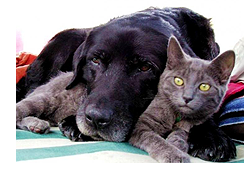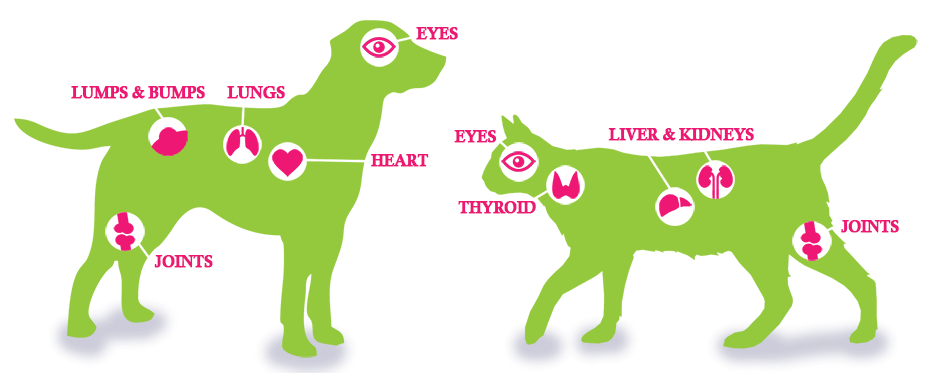
The general rule of thumb is that our pets age 8 years for every one of our own. This means old age sneaks up on them a lot faster than it does on us humans. Therefore, the illnesses that can come with old age can be just as devious! So, here is what to keep a look out for in our senior pets:
LUMPS & BUMPS
Aging pets commonly develop lumps that can actually become cancerous and spread to the lymph nodes and other organs, so it is important that if you notice any on your fur friend that you take them to your Vet ASAP. Make sure a regular look over your pet is a weekly habit.
JOINTS
Conditions such as osteoarthritis and hip dysplasia affect bone joints. While arthritis is most common in large breed dogs over the age of seven, smaller dogs can also suffer from this condition of painful, swollen joints. Hip dysplasia is something that develops in much younger years and becomes apparent when the joint cartilage starts to wear out in later life. This condition is commonly in the hips and elbows and both are evident in your pet’s unwillingness to move around too quickly.
EYES
Cataracts and Glaucoma are the bane of old age and are just as prevalent in our pets. Cataracts are caused by lens changes and commonly develop in diabetic pets. This condition leaves the eye looking gray/slightly milky and will cause blindness if left unchecked. Consulting your vet is important for knowing when and if surgery is needed.
Glaucoma is the death of the optic nerve and has early signs of red and sore eyes. Once again, consulting with your vet will help determine the best route for dealing with this condition.
HEART
Breathlessness, cough, a bloated abdomen and decreased physical stamina are all signs of cardiac issues. As the heart ages it becomes less functional and can lead to heart murmurs or a swollen heart. Seek Veterinarian advice immediately if noticing any of these signs.
LUNGS
The elasticity in the lungs is also affected by the aging process, meaning that they cannot expand properly or the tubes begin to lose their shape. Difficulty breathing, cough and lack of stamina are the main signs of lung diseases such as Bronchitis, Pneumonia and Emphysema.
KIDNEYS
Very common in cats, kidney failure shows signs with excessive thirst, weight loss, mouth ulcers, strong-smelling breath and nausea. If noticing any of these signs, visit your local Vet immediately as early detection lengthens and improves the quality of life.
LIVER
The liver processes waste, so malfunction of the liver can cause an over abundance of toxins in the body and cause lack of appetite, nausea and possible seizures. Once again, early detection is the key to fighting this disease.
DIABETES
Excessive thirst, weight loss and increased appetite are the signs of this nasty disease and diagnosing whether your pet has diabetes is as simple as a urine and blood test.
THYROID DISEASE
Most common in our feline friends, an overactive thyroid commonly shows up with signs of vomiting, weight loss and heart issues.
Health issues in senior pets may be daunting when looking at them together like this. They can, however, all be addressed by keeping a close eye on any changes in your pet and maintaining regular pet health checks with your Vet.
We have some exciting news for all our Senior friends! Dr Kathryn and Dr Peter are always looking for ways to ensure our patients receive outstanding care affordably. Our vets have developed and are excited to announce the Pet Doctors Senior Wellness Plan!
This program provides a comprehensive senior screening, so your senior cat or dog can maintain their ideal body weight, improve the quality and longevity of their life, minimise disease risk and disease management all for an amazing price!
Contact Pet Doctors on 5576 0400 for more information.


